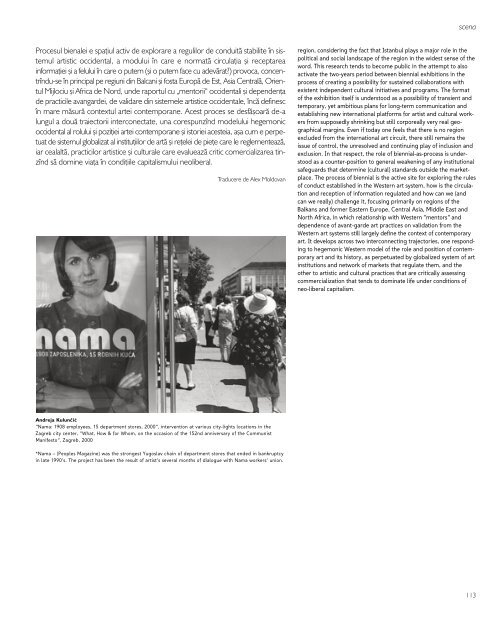You also want an ePaper? Increase the reach of your titles
YUMPU automatically turns print PDFs into web optimized ePapers that Google loves.
scena<br />
Procesul bienalei e spafliul activ de explorare a regulilor de conduitæ stabilite în sistemul<br />
artistic occidental, a modului în care e normatæ circulaflia øi receptarea<br />
informafliei øi a felului în care o putem (øi o putem face cu adeværat?) provoca, concentrîndu-se<br />
în principal pe regiuni din Balcani øi fosta Europæ de Est, Asia Centralæ, Orientul<br />
Mijlociu øi Africa de Nord, unde raportul cu „mentorii“ occidentali øi dependenfla<br />
de practicile avangardei, de validare din sistemele artistice occidentale, încæ definesc<br />
în mare mæsuræ contextul artei contemporane. Acest proces se desfæøoaræ de-a<br />
lungul a douæ traiectorii interconectate, una corespunzînd modelului hegemonic<br />
occidental al rolului øi pozifliei artei contemporane øi istoriei acesteia, aøa cum e perpetuat<br />
de sistemul globalizat al institufliilor de artæ øi reflelei de piefle care le reglementeazæ,<br />
iar cealaltæ, practicilor artistice øi culturale care evalueazæ critic comercializarea tinzînd<br />
sæ domine viafla în condifliile capitalismului neoliberal.<br />
Traducere de Alex Moldovan<br />
region, considering the fact that Istanbul plays a major role in the<br />
political and social landscape of the region in the widest sense of the<br />
word. This research tends to become public in the attempt to also<br />
activate the two-years period between biennial exhibitions in the<br />
process of creating a possibility for sustained collaborations with<br />
existent independent cultural initiatives and programs. The <strong>format</strong><br />
of the exhibition itself is understood as a possibility of transient and<br />
temporary, yet ambitious plans for long-term communication and<br />
establishing new international platforms for artist and cultural workers<br />
from supposedly shrinking but still corporeally very real geographical<br />
margins. Even if today one feels that there is no region<br />
excluded from the international art circuit, there still remains the<br />
issue of control, the unresolved and continuing play of inclusion and<br />
exclusion. In that respect, the role of biennial-as-process is understood<br />
as a counter-position to general weakening of any institutional<br />
safeguards that determine (cultural) standards outside the marketplace.<br />
The process of biennial is the active site for exploring the rules<br />
of conduct established in the Western art system, how is the circulation<br />
and reception of in<strong>format</strong>ion regulated and how can we (and<br />
can we really) challenge it, focusing primarily on regions of the<br />
Balkans and former Eastern Europe, Central Asia, Middle East and<br />
North Africa, in which relationship with Western “mentors“ and<br />
dependence of avant-garde art practices on validation from the<br />
Western art systems still largely define the context of contemporary<br />
art. It develops across two interconnecting trajectories, one responding<br />
to hegemonic Western model of the role and position of contemporary<br />
art and its history, as perpetuated by globalized system of art<br />
institutions and network of markets that regulate them, and the<br />
other to artistic and cultural practices that are critically assessing<br />
commercialization that tends to dominate life under conditions of<br />
neo-liberal capitalism.<br />
Andreja Kulunčić<br />
“Nama: 1908 employees, 15 department stores, 2000“, intervention at various city-lights locations in the<br />
Zagreb city center, “What, How & for Whom, on the occasion of the 152nd anniversary of the Communist<br />
Manifesto“, Zagreb, 2000<br />
*Nama – (Peoples Magazine) was the strongest Yugoslav chain of department stores that ended in bankruptcy<br />
in late 1990’s. The project has been the result of artist’s several months of dialogue with Nama workers’ union.<br />
113














